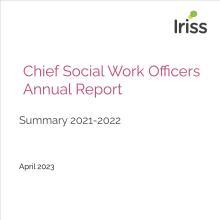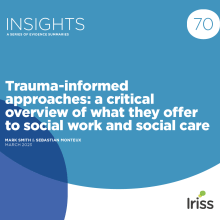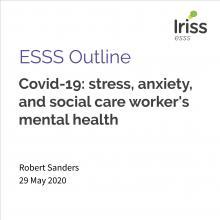When I started out using care that wasn't provided by my family, so formal care as I would call it from the local authority, all of my package was funded through independent living fund and directly from the local authority to an agency that I chose, so, a form of self-directed support, an early form of it, particularly obviously the ILS side of it, but also the way in which the local authority bought the service that I picked, and interviewed the agency. So the agency provided me care whilst I was at university, and partly that was because, partly I chose an agency because I was eighteen years old and I certainly was no employment lawyer, and still I'm not an employment lawyer, but I was gonna have to make new friends, live in a new area, move away from my family, learn how to budget, know what you buy when you cook mince and potatoes, all of these things, I also didn't want to also have to become an employer at that point in time.
Partly because there wasn't the support services in the local area that I really needed that could have been essential to that decision and helped me maybe make my decision different. But also because I wanted to see how I got on with an agency and try out things. So I worked with an agency in the first instance, and it went well until the people who they had put in place, were either off sick or needed holidays, or moved onto a different job. At that point, the system became haphazard. I was getting different people in, people who would then have to very, very quickly on the job, train. You know when someone turns up to get you out of bed, you don't have much time to train them on how you do it, especially if you have to be some where in an hour. And so that became a bit onerous, and the agency weren't responding to the things that I needed. What I needed from the agency was continuity, consistency, and understanding of what I needed. On one occasion, for example, I was asked to go along to a meeting with the Prime Minister, of all people at the time, and I had to give security clearance. And I had phoned the agency and said my PA's got to come with me. I need to know the person will definitely be this person. That's fine, that's okay. But then they sent someone else on the day and that meant I couldn't attend the meeting because I couldn't go with someone who hadn't passed through security clearance.
Now that was something that was incredibly important for my own personal development, my career, my education and all of these things, but because they hadn't responded to my very specific needs, and I know that is a unique example, but that could be something, it could be a cultural need that you explain and all of these things are extremely important. And agencies, now that self directed support is to become more of the norm, will need to be more aware of that particular nuance and how they market themselves and I know that they're beginning to go down that route to look at marketing on a more individual basis. I then started to employ my own staff as a result of one of my PAs through the agency going on maternity leave and I thought this might be a good opportunity for me just to say right, I'll move on and try it myself. So I got a lot of support from the support organization at the time and from other disabled people who helped me through the process, helped me understand employment law.
Very often whenever I do presentations, either personally or through my work on this, people say, but you're a good candidate for this, you obviously understand that you're articulate, you must know employment law. I didn't wake up one morning knowing it, these are, like everybody, we develop our own, our continuing personal development is something that by the very nature of the term 'continuing', it continues and it grows, and, we're all learning all the time, and I'm exactly the same. And ok, I have certain predispositions to been able to, I like learning cos I'm a bit of a geek. And so, you know I do enjoy taking on new things, but I still needed an awful lot of support to be able to do it. And that's one of the things that is essential, an essential part of self directed support is ensuring that disabled people and others who access it have support to be able to make the most of it. Not just support to be able to choose who they're going to employ or what agency they're going to pick or what questions they're gonna ask them, but support to think how they wanna get the most out of their package, how are they gonna achieve what they want to achieve in life, to raise their aspirations, and that doesn't just come by tick-box support. It comes from peer support, it comes from seeing how others have done it for themselves, and that it can be done. And raising aspirations is very much about raising consciousness as well, and letting people see that they're more than they ever thought they could be, and those things were important to me when it came to deciding to use personal assistance and get direct payments, but also in terms of choosing the people that would work with me, and that's a really, really personal thing. And there's always a lot of discussion around work force issues, and regulation of the PA workforce for example. And I've always kinda shied away from over regulation of the PA workforce, for a couple of reasons. One of them is that you can never be 100 percent sure whether the person is chosen through an agency or whether you interview them yourself, whether that person is going to end up robbing you or whether they're gonna be the best PA you could ever choose.
You can put certain systems in place so you can ask the right questions, you can have a good robust recruitment procedure, you can do disclosure checks, all of these things, which as a personal assistant employer you can do as well as an agency if you have the support to do it and that's why support organizations are essential. For example, when I use the agency, one of the people did end up stealing money from me. I've never had that problem when I chose my own PAs. Now that's not to say the agencies will...and I don't mean that, but the point I suppose I'm making is that, you can never rule it out, you can never say that one option is safer, really, than another. Of course you can without support, if someone just told go and pick Joe Blogs off the street, they''ll do ya, then of course you can say there's a bit of a risk there, less of a risk here, but with support in place, there is no reason why people cant go through a very robust recruitment system. And what someone wants in a personal assistant is so specific to them that it's hard to see what generic requirements are. For example, for me personally, and this may not necessarily be good practice and certainly when I was working directly on a one to one basis providing support to personal assistant employers, I probably wouldn't have advised this, but one of the things I look for is someone who's got a slightly different experience to personal assistant experience in the past. Part of that reason is because when, in the past, when I've had personal assistants who have come from that particular background. I've had them come in and say, is there a communication book? Just talk to me, you don't really need a communication book, but for some people you would, and that's absolutely right and good and essential. But it's so individual, that there's no "one size fits all" and that's why support organizations from a peer support point of view, so disabled people's organizations are really, really good at helping to pick up on the nuances and the specifics that might be relevant to that particular person. So for example, a lot of the time when I was advising individuals, I would be saying things like, "So how you gonna make sure that one person knows what that other person's doing, and that might just be because I understand the person's got a lot on their mind, or it might be because the communication requires that something a bit more robust than just chatting.
So, all of these things are very specific and very individual. The qualities I look for in a personal assistant are things like someone who's quite outgoing, sociable, because I'm always out and about. It's very, very rare occasions when it's just going to be me and them. They need to be well and able to come to my work and work in an environment that is obviously acutely aware of equality and human rights. They need to be able to cook, because I like my grub and I like it good, so yeah again, that's one of the things that I ask for. And I like them to be punctual, reliable, flexible. Flexible is essential for me because it's not only impacting on my own personal choice about maybe having a lie-in one day, or getting up early the next, but it can actually impact on my career and my job, you know, if people want me to attend meetings or to be at work at a certain time, there's only so much flexibility I can have within that so when I'm interviewing, for example, I always say to people, "If you're late, I'm late. If I'm late, that impacts on my job, so if you're late, it will impact on your job and so there will be a..." Do you know what I mean? So these things are important. The other thing that I always put at the head of any advert is that you can do hair and makeup, which a lot of people find, you know, what about health and safety, what about food hygiene certificates? I'd rather have somebody say to me, I've been working as a hairdresser for five years, do you want me?
But that's a personal thing to me what is important is that the person is supported to understand what is important to them, that they understand how the system will work, what the person as an employee, and what the people as employees and employers will have to do. That there is support out there so it's often, it was said to me in the very first instance, this will be a lot of work, and I remember thinking, it looks like it might be. But in actual fact, once you get in to the swing of it, and with the support of the support organizations that I know the Scottish government are hoping to be able to support heavily. With the support from those people and the essential peer support of people that have been there and done it, it's much, much easier and possible to do it. And even in emergency situations, like for example, today when I'm filming, my PA is off sick. So I've had to call in someone, a cover PA and the only person available to do it is my partner's PA. But he needs her for an hour, just now in actual fact, which is why she's not here so I've had to change the way that I do things slightly. But because I've got, obviously, the peer support from my partner, which is fairly unique, but from other disabled people, you can talk to them about, 'what will I do?' Have you got somebody spare? Where's a good agency I can go to? So these are the things that are absolutely essential to help people to manage the sort of flexible package that they want. But that's not to forget that agencies can also be a really useful source. And I'm not saying I would never go back to agencies, because the agency served me well for a long, long time. My lifestyle became very, very flexible and in some senses, you know, sadly unique, because not many disabled people are lucky enough to be in position that I am, and hold down full time employment and that meant, you know, it changed the sort of things I was looking for. And at the time there was less of a focus for them to be specifically deem themselves up to individuals, but I know that they're working towards that, and so I would just say support is absolutely crucial, to help people understand what they need, what they want, and what the constraints in the system in terms of employment law are, and how best to get that. I recruit PAs off Gumtree, and things like that, and then I'll go through and, you know, I collect references, I do interviews, and all of the things you would expect, but other people will prefer to use the job centre, they might think that it's more robust and more secure, but it's very much an individual thing and the system must be flexible enough to accommodate that.




